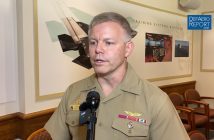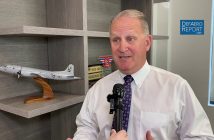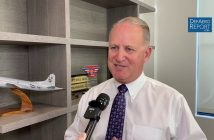Maj. Gen. Hans-Christian Mathiesen, Denmark’s chief of Army Staff, discusses priorities, global and local deployments, and wanting to replace soldiers with unmanned systems during an interview at the 2018 AUSA Annual Meeting in Washington, DC.
Maj. Gen. Hans-Christian Mathiesen
Denmark’s Chief of Army Staff
AUSA Annual Meeting
October 2018
Vago Muradian: Welcome to the Defense and Aerospace Report. I’m Vago Muradian here at the Association of the United States Army’s Annual Conference and Trade Show, the number one gathering of U.S. Army leaders and other military leaders from around the world to discuss the service’s future, technology, budgets, strategy and more. Our coverage here is sponsored by Bell, a Textron company; Elbit Systems of America; Leonardo DRS; L3 Technologies; and SAFRAN. And we’re positively honored to have the Chief of the Danish Army, Hans-Christian Mathiesen who is a Major General. Sir, thanks very much for making time. I know how busy you are, and I really appreciate it.
Maj. Gen. Hans-Christian Mathiesen: Thank you very much.
Mr. Muradian: You’re here at AUSA. Talk to us a little bit about the cooperative relationship with the United States and why it was so important for you to spend three or four days here in Washington at this conference.
Maj. Gen. Mathiesen: I even extended it this year. So I spent almost two weeks in the States this time. I started out down at Fort Eustis in the southern part of Virginia, to talk to the Training and Doctrine Command because, you know, the American Army has very many thinkers. We’re also very good thinkers in Denmark, but we don’t have the same amount. So there’s a difference in scale. Most of the main operation concept has matured and it’s very important for us to follow what is the American Army and what is the United States Armed Forces, the way they are developing. Because we are so dependent on what they do. We are a very small country and the most important security partner we have is the United States.
Mr. Muradian: You’re a NATO nation, an EU nation, but also you said a very close partner with the United States. The F-35 is the largest program in Danish military history. Talk to us a little bit about your modernization priorities and other force priorities at a time when Russia is a greater concern for everybody. There are folks in NATO who discuss look, there may be a NATO role, for example, in a China crisis should that happen, so that European nations have got to start thinking about the Pacific as well.
From the standpoint of somebody who manages a ground force that has been globally deployed for a very, very long time, a very significant player in Afghanistan and in Iraq. Talk to us a little bit about how all of the changing priorities around you are changing your priorities as Chief of the Danish Army.
Maj. Gen. Mathiesen: Well they are to some extent, but we are still globally deployed, and I expect us to continue to be so. So the force structure is not all about going up against eventually, a peer opponent, and in some ways maybe even an adversary that has capacities that exceeds and overmatch the one we have.
But of course that, again, is important, but on top of the global engagement and the more collective defense engagement within the alliance, we also now are deployed in our homeland. So I have three purposes for the same force structure right now. So it is important that we grow the Army and we are doing so.
So the priorities. For me, it’s very important as a small contributor to the collective defense that we are interoperable, we can operate with everybody. But the demands from the future operating environment really talks about agility and lethality.
So what I’m looking at here at AUSA is the technology developments that industry puts forward, and I do think there’s a lot of things ongoing right now, especially in the area of communications where we can now do a lot more with less. And the same goes for many of the weapon systems.
So it’s very important for us to get inspired by what industry is doing. We can inspire them by the questions we ask. And priorities for me, to return to your question, really is to do with interoperability, lethality of the force, and basically also, to some extent, replace the soldier with piloted systems, remoteless systems.
Mr. Muradian: We were on Bornholm not very long ago. There was a trip that was cosponsored by the Atlantic Council and Denmark, and we thank you for that. I visited in June and we did go to Bornholm and see the reconnaissance battalion there that was going to deploy on July 4, if I recall correctly, was going to Afghanistan for its deployment cycle. Talk to us a little bit about that mission. I think everybody has a tendency now of forgetting that there’s still such an important contribution of troops there. Talk to us about how the unit’s doing and the mission they’re performing.
Maj. Gen. Mathiesen: Well, if you ask them themselves, they’re doing pretty well. But I do agree, because I used to command that battalion. So previous in my career I was the garrison commander and also the battalion commander of the reccy battalion on Bornholm.
But they are there the whole year. The first team that returned after we actually grew the force, our contingent, from around 60 or 70 up to a plus 100, so now we have a full squadron doing escorts in and around Kabul for the mentors that is traveling, all the different bits and pieces of the Afghan Army. They’re doing well. They are performing well. And it has allowed the mission that they can do better, because now we have more forces in place so they can do the escorts.
So it’s very important for us, and I do expect us to be deployed there continuously for years to come.
Mr. Muradian: Are you, as the standpoint of the alliance and a strategy, are you satisfied with the strategy that is in Afghanistan right now? Because there is a big debate in the United States that, you know, look, the Taliban are gaining ground. There’s a concern among some that the United States is pushing toward talks to resolve a conflict that actually may be many years from resolution. You sort of said the expectation is to be there for a considerably longer time.
What’s your sense, as somebody who’s deploying these troops? Is this the right strategy? Does the strategy have to change? Do we need to have a different approach for this conflict that’s now celebrating, sadly, its 17th year?
Maj. Gen. Mathiesen: Yeah, very sadly. Of course we should not be there forever, but I do believe that the latest adjustment in strategy, moving out again to the corps level, mentoring at the division/corps level, even down to the brigade level for the Afghan Army in some areas where they’re most challenged is the right approach.
And for us, it will mean an ongoing commitment together with the U.S. lead and NATO lead in that mission.
What we should be better at, basically, is to explain ourselves in terms of the results we actually, what is the force actually doing. Otherwise, it tends to be a forgotten mission and the soldiers do not deserve that. We should be better at strategic communication and explaining about what are we doing so that both the American citizens and the Danish citizens are well aware of what we’re doing, why are we doing it, and when can we expect this to end.
Mr. Muradian: Do you think that, what were some of the most important lessons? One of the important things to also mention is Danish forces were involved also in the fight against ISIS as well.
Do you expect to restart or become involved again any time soon in that campaign? Or is that, or do you feel that that’s the limit of Danish involvement so far in that mission?
Maj. Gen. Mathiesen: No, we’re still there. So we’re still together with the U.S. Marine Corps at Al Asad Air Base. We’ve been there for three years now. I think the mission there will review the strategy and the tactical plans that comes out of that in 2020, and so up until 2020 I don’t see any change in the Danish engagement there. It’s not my decision, of course, but that’s not what I’m hearing in Copenhagen.
Mr. Muradian: Very good. And you’ve been involved in operations in both countries. Talk to us about what some of the lessons learned are from those two counterinsurgency conflicts that you think are actually applicable to a great power competition. There are some who say no, you know, there’s no overlap between the two and it’s a completely different game, but how do you see that? What are lessons that we learned in Iraq and Afghanistan, or even in the fight against ISIS very recently that you think is applicable to even a great power competition?
Maj. Gen. Mathiesen: Well, we’ve seen some of the technologies we’re going to build a future force on in use in those conflicts. So of course there are lessons learned that we can use for the future.
Also, if I look at my own Army, many of my junior officers and junior NCOs, they have combat experience in Afghanistan. It’s not the kind of combat we would expect if we were going up against peer opponents, but then again at the tactical level, at the company level, a fight is a fight. So we have experienced, very skilled officers and NCOs that have been there. They have been in harm’s way. And that is a very good experience to build a future force on.
Mr. Muradian: Let me ask you one last question. Russia had its latest Vostok Exercise. Very large-scale. Maybe not as large-scale as Moscow would have everybody believe, but you’re a life-long professional soldier. As you look at that exercise, what were some of the lessons you took away from what the Russians were doing that helps change how you’re thinking about the future?
Maj. Gen. Mathiesen: Well, I think it’s just a reminder to everybody that we in the alliance need to stick together. In the international rules-based order there seems to be all sorts of attempts to challenge that. I think it’s very important for us professionals to continue to work across the borders so that we stick together because the amount of force that he can mass is something that should worry us. Not that I do expect a conflict in the near future, I certainly do not because we can overmatch, but it’s very important for us to continue to work together closely. And we as military professionals have all the possibilities in the world to do so. Thus, I’m here at AUSA talking to the United States Army.
Mr. Muradian: Let me ask you one last question, and I’ll try to keep it as uncontroversial as I can. There is concern about some of the rhetoric that the President has expressed, whether about NATO or about America’s allies or America First. At a working level, has that had any impact at all in your relationships with either your allies or with your American partners?
Maj. Gen. Mathiesen: No. I haven’t sensed any. You know, the presidency is high above my pay grade, and when I talk to my colleagues I think that we are continuously concerned about the things that matter to us. So politics is politics, and military to military is another thing.
Mr. Muradian: Sir, thanks very much. Hans-Christian Mathiesen, Major General, Chief of the Danish Army. A real pleasure and honor, sir. Looking forward to seeing you in Copenhagen soon.
Maj. Gen. Mathiesen: Hopefully. Thank you.
Mr. Muradian: Thank you, sir.
-30-




